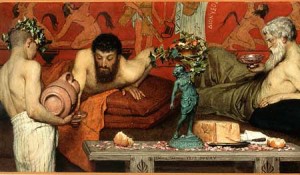 The similarities between Socrates and Christ are bound together with love; love toward our fellow men and women, and love toward our Creator. God is love; and his affection fulfills all His laws. Socrates was born in a pre-Christian era but his message was one of love — the universal language. Our western culture often associates the word with physical love, but many also seek its essence. Socrates had his own unique view, associating it with moral actions of human beings, and the gods’ acceptance of these actions. For him, love is also associated with beauty: the beauty of souls, the beauty of laws, activities, and customs, and the beauty of knowledge, ideas, and theories, and the Form of Beauty itself. To understand his view, it is helpful if we participate in an ancient Greek symposium along with Socrates, himself, so step back in time with me for an evening of entertainment.
The similarities between Socrates and Christ are bound together with love; love toward our fellow men and women, and love toward our Creator. God is love; and his affection fulfills all His laws. Socrates was born in a pre-Christian era but his message was one of love — the universal language. Our western culture often associates the word with physical love, but many also seek its essence. Socrates had his own unique view, associating it with moral actions of human beings, and the gods’ acceptance of these actions. For him, love is also associated with beauty: the beauty of souls, the beauty of laws, activities, and customs, and the beauty of knowledge, ideas, and theories, and the Form of Beauty itself. To understand his view, it is helpful if we participate in an ancient Greek symposium along with Socrates, himself, so step back in time with me for an evening of entertainment.
The ancient Greek symposium was a male aristocratic social activity, taking place in the evening where the men drank together in a convivial atmosphere while they ate, conversed, recited poetry, played music, joked, gossiped, or performed games of skill and balance, while being entertained by professional dancers and courtesans. The status and wealth of the host was indicated by his guest list, as well as the quality of the food and the serving vessels. The symposium consisted of two parts: the first was dedicated to the food, generally simple fare, followed by the second, which was dedicated to drinking. The wine was accompanied by snacks that included chestnuts, beans, toasted wheat and honey cakes. By the late sixth century B.C., symposium vessels included wine coolers, jugs, drinking cups, and mixing vessels decorated with scenes, for example, Dionysus and his followers. The symposiarch (the master of ceremonies) would mix the wine to water in a strength that he determined, usually three or four parts water to one part wine. The wine was mixed in a large krater, and then slave boys filled pitchers from the krater and poured the drink into each participant’s cup.
The Symposium is a dialogue written by Plato (no later than 385 B.C.) that discusses the events of a ‘symposium’ or a formal drinking party held in honor of Agathon in 416 B.C., a tragedian who had just successfully produced his first victorious tragedy. The gatherers reflect that the god of Love is neglected, so they honor the god with speeches and praise of “Love” (eros). The focus of the Symposium (written in a narrative structure) is the adult male’s role as ethical and intellectual educator of the adolescent male.
The symposium was a gathering of Athenian men at a private home where they could relax reclined on cushions — usually one to two men on a couch — and discuss values while enjoying a social event that also liberated them from the everyday restraints of a regulated environment. The symposium we are invited to took place at Agathon’s house. Among his guests were Socrates, Phaedrus, Pausanias, Eryximachus, Aristophanes, and Aristodemus. Aristodemus, a great admirer of Socrates, relays the events to Apollodorus, who in turn tells the story to the unnamed Athenian in Plato’s Symposium. Aristodemus explains that he ran into Socrates, “who had just bathed and was looking so good. Socrates replied, ‘I am going to Agathon’s for dinner. I managed to avoid yesterday’s victory party—I really don’t like crowds—but I promised to be there today. So, naturally, I took great pains with my appearance: I’m going to the house of a good-looking man; I had to look my best.’ ” On the way to the symposium, Socrates was delayed for he had stopped on a porch to meditate until the banquet was half over. (He frequently drifted off in philosophical reverie, remaining motionless while receiving philosophical wisdom.)
The plan for the evening was to discuss the nature of love, a subject not addressed as frequently as it should be, noted Eryximachus…
For more information on the symposium, please purchase a copy of Joan’s book, Socrates, Jesus and Freedom. Copyright © 2016 by Joan Arnsteen
